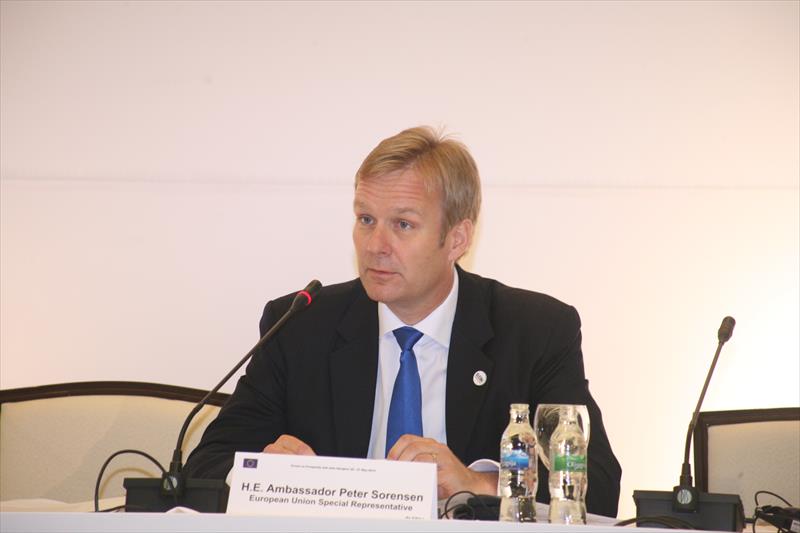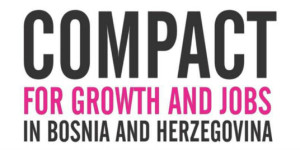27 May 2014, Sarajevo
Excellencies, ladies and gentlemen, dear friends,
Let me start by thanking my Deputy Renzo Daviddi and all my staff for having organised this Forum on such a short notice. This was a tremendous job they did and on behalf of all of us, I would like to wholeheartedly thank them.
Another thank you goes to all the participants at the Forum for Prosperity and Jobs in Bosnia and Herzegovina who have identified, following a wide-ranging and comprehensive debate, the main economic problems in the country and have deliberated inputs from a broad spectrum of society.
The reform agenda is clear. Unavoidably, it is affected by the dramatic natural disaster which has affected this country in the past two weeks. We underlined it yesterday, when we opened the Forum. Let me underline it again today. The conclusions reflect our willingness to help the country, although they go much further than that.
My conclusion is that high unemployment rates (especially among the youth); low rates of investment and growth; a complicated and non-transparent business climate (and corruption); and a low level of social support for the less-well-off in society are the key issues to be addressed by a coherent and comprehensive reform agenda. Participants noted that implementation has often been lacking even when the reform agenda was known.
I have noted a determination among the participants that a fresh start is vital and that it will be possible to reignite the process of changing the economy. Many of the participants have stressed that opportunities are often captured by entrenched interests who then deny jobs and other prospects to those on the outside. I therefore take away with me that the discussion focussed on a set of reform measures.
Those identified by the participants as the most urgent topics to address were:
1. Taxes on jobs: BiH needs to spur employment and improve competitiveness by reducing the cost of working to a far lower percentage of labour costs (toward the European average of around 30 percent). The authorities are urged to consider proposals to lower the tax burden on labour, with the assistance of the IMF, while ensuring fiscal sustainability.
2. Barriers to jobs: BiH needs to enact a set of labour market reforms to increase job creation, including by revitalising the process of collective bargaining, reducing the disincentives for hiring and, in particular, promoting inclusion of the young population in the workforce.
3. Business climate: BiH is ranked 131st in the World Bank’s Doing Business Indicators and this must improve. The discussion stressed the need for the authorities to improve competitiveness by approving a results-based plan, aimed at improving indicators such as Doing Business rankings to match the regional average.
4. Enterprises: BiH has a weak private sector and serious difficulties in attracting investors. Better investor protection laws and practices are required including corporate governance, access to finance (particularly for new enterprises) and a more efficient insolvency framework. The authorities were urged to quickly work on the reforms necessary to strengthen the insolvency framework, stimulate privatisation and stimulate new business creation.
5. Corruption: Corruption kills initiative and investment in Bosnia and Herzegovina’s economy. Fighting corruption will require strengthening adherence to the rule of law (police, prosecutors and judges) and deep public administration reform. The EU will provide political support and guidance to BiH authorities in the Structure Dialogue on Justice and Rule of law. It will also provide assistance in cooperation with local counterparts to undertake a comprehensive mapping of para-fiscal fees and other costs and permits with a view to elevating their transparency. The on-going review of the Anti-Corruption strategy should involve all institutions, civil society and academia.
6. Social protection: Bosnia and Herzegovina must improve the targeting of social assistance through a set of measures that would make social protection policies more effective, efficient and equitable. The World Bank is available to work together with the authorities in moving forward with these reforms.
The participants pointed out several times that the country has largely failed to enact such measures and appealed for the reform agenda to restart with renewed vigour.
Ladies and gentlemen,
On this basis, I can now say to you that we will continue working on defining a Compact for Growth and Jobs for Bosnia and Herzegovina. We will seek the widest possible consensus on its content and priority. Once we have achieved this, we will closely monitor its implementation.
I am extremely grateful to all participants of the Forum, to our partners and, in particular, to the Moderators of the Workshops, who played a crucial role in this event.
Thank you very much.




